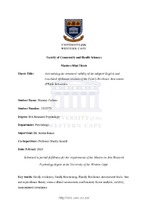| dc.contributor.advisor | Isaacs, Serena | |
| dc.contributor.advisor | Savahl, Shazly | |
| dc.contributor.author | Carlson, Shantay | |
| dc.date.accessioned | 2020-12-03T10:26:49Z | |
| dc.date.available | 2020-12-03T10:26:49Z | |
| dc.date.issued | 2020 | |
| dc.identifier.uri | http://hdl.handle.net/11394/7675 | |
| dc.description | Magister Artium (Psychology) - MA(Psych) | en_US |
| dc.description.abstract | Family resilience has become an important concept in mental health and family research over
the past twenty years. An assessment tool that was found to assess this concept within
western English-speaking populations is the Family Resilience Assessment Scale (FRAS).
The FRAS was developed by Sixbey and is based on Walsh’s model of family resilience, a
prominent theorist in family resilience research. A recent study has translated and adapted the
original scale into Afrikaans, which is one of the eleven official languages of South Africa.
This was done for the FRAS to be utilised in a context other than the one it was developed
for. | en_US |
| dc.language.iso | en | en_US |
| dc.publisher | University of Western Cape | en_US |
| dc.subject | Family resilience | en_US |
| dc.subject | Family functioning | en_US |
| dc.subject | Validity | en_US |
| dc.subject | Cross-cultural assessment | en_US |
| dc.subject | Confirmatory factor analysis | en_US |
| dc.title | Ascertaining the structural validity of the adapted English and translated Afrikaans versions of the Family Resilience Assessment (FRAS) Sub-scales | en_US |
| dc.rights.holder | University of Western Cape | en_US |

